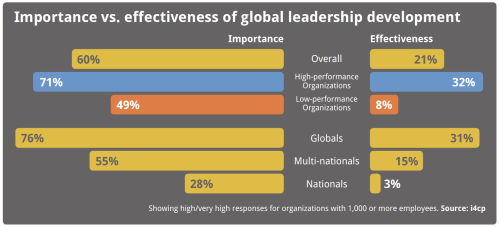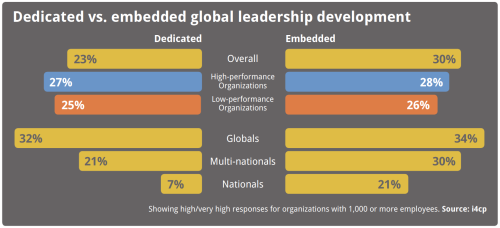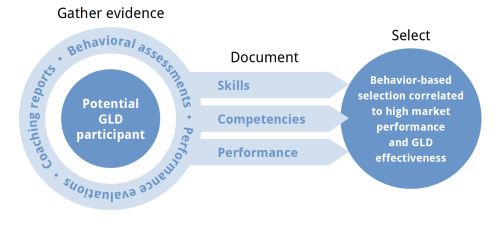 The Institute for Corporate Productivity (i4cp) recently released its 5th iteration of their GLD (Global Leadership Development) study. The report, “Global Leadership Development: Preparing Leaders for a Globalized Market”, examines opportunities and challenges for organizations working to develop “global leaders,” or leaders who have global expertise and can perform in an international environment. With factors like technology making the workforce increasingly global, this is an area of leadership development that organizations should consider adding to their focus. As i4cp discusses in the report, “The purposeful development of global competencies and capabilities among leaders is essential to organizational effectiveness and competitive edge.” Attention is certainly shifting towards GLD. However, despite that the number of organizations focusing on global leadership (through either general leadership development programs or specific GLD programs) has grown from 31% in 2010 to 44% in 2014, this figure still equates to less than 50% of organizations addressing global leadership development. Even among large corporations who may have greater resources to dedicate towards GLD programs, less than 54% report addressing GLD.
The Institute for Corporate Productivity (i4cp) recently released its 5th iteration of their GLD (Global Leadership Development) study. The report, “Global Leadership Development: Preparing Leaders for a Globalized Market”, examines opportunities and challenges for organizations working to develop “global leaders,” or leaders who have global expertise and can perform in an international environment. With factors like technology making the workforce increasingly global, this is an area of leadership development that organizations should consider adding to their focus. As i4cp discusses in the report, “The purposeful development of global competencies and capabilities among leaders is essential to organizational effectiveness and competitive edge.” Attention is certainly shifting towards GLD. However, despite that the number of organizations focusing on global leadership (through either general leadership development programs or specific GLD programs) has grown from 31% in 2010 to 44% in 2014, this figure still equates to less than 50% of organizations addressing global leadership development. Even among large corporations who may have greater resources to dedicate towards GLD programs, less than 54% report addressing GLD.
I’ve discussed the current importance placed on leadership development in previous posts (here and here), and this holds true in i4cp’s study. Organizations perceive leadership development as a critical area of focus right now, and yet, most organizations report few programs and/or low effectiveness when it comes to their current approach to leadership development. From i4cp’s study of human capital issues specifically, it is reported that organizations are not only ineffective at leadership development, they are increasingly getting worse at it, with 27% reporting effective leadership development in 2010, versus 25% in 2014. This holds true for global leadership development as well, with only 21% of large employers stating they are effective at GLD, despite that 60% view developing global skill in leaders as “highly important.”
 Additionally only 53% of large organizations report making an effort to develop global leaders. However on a positive note, those organizations that have either dedicated GLD programs or GLD programs embedded within general leadership development programs, report an increase in focus on GLD (up from 48% in 2013).
Additionally only 53% of large organizations report making an effort to develop global leaders. However on a positive note, those organizations that have either dedicated GLD programs or GLD programs embedded within general leadership development programs, report an increase in focus on GLD (up from 48% in 2013).
 One of several key findings from i4cp’s 2104 study is that for organizations to develop an effective GLD program, they must connect the curriculum to the business at a local level. Leaders should understand how the business is different in relation to region – an example being that one region may have a completely different sales approach than another region. Competencies to include as outlined by i4cp’s report for GLD effectiveness are:
One of several key findings from i4cp’s 2104 study is that for organizations to develop an effective GLD program, they must connect the curriculum to the business at a local level. Leaders should understand how the business is different in relation to region – an example being that one region may have a completely different sales approach than another region. Competencies to include as outlined by i4cp’s report for GLD effectiveness are:
- Knowledge of cultures/customs in specific markets.
- Ability to be conversational or fluent in prominent languages within specific markets.
- Knowledge about customers and/or prospective customers in specific markets.
It should be pointed out that for leaders to gain local perspective or knowledge, they do not necessarily need to physically immerse themselves in a region. Instead, organizations can leverage technology like webcasts, audio/video conferences, and social media, to bring leaders regional-specific learning without incurring the potential costs (both monetary costs like transportation and non-monetary like the impact of relocation on a family) of removing a leader from their current role. I4cp’s study also found that for GLD, consistency in program delivery on global basis, in combination with local customization, correlated to successful GLD programs.
Other key findings included that high performing organizations were more likely to define leaders by influence rather than authority (for example: by their ability to consider/adopt a point of view or excellence in work performance), and that GLD participants should be selected on behavior-based evidence rather than through recommendations by senior leadership or an employee’s direct supervisor. Close to two-thirds of respondents (both LPO’s and HPO’s) currently rely on these methods for selecting GLD participants. However, neither of these selection methods has been proven to increase market performance or GLD effectiveness. Instead, organizations should look to documented evidence of skills, competencies, and performance, when selecting participants, methods that have been correlated to market performance and demonstrate even higher correlations in GLD effectiveness.
I4cp’s study also suggests that organizations should develop GLD programs with a focus on the future. Several future focused practices for creating curriculum had strong correlations to both market performance and effective GLD:
- Determining future-focused critical roles
- Conducting an internal skills inventory to determine the longer-term gaps in critical roles
- Identifying the specific skills needed in future-focused critical roles
- Conducting environmental scanning to determine external skills shortages in future-focused key markets
Of course, as with looking at anything long-term, regularly reviewing assumptions is very important.
No one doubts that every day our businesses, our customers, our stakeholders are getting more global. And in most cases, they are getting more global at high rates of speed. What can explain the lack of speed and focus organizations are employing when developing global leadership competencies and effectiveness? With the current state of global worker demographics and educational readiness for employment in general, it is mystifying that leadership development programs in general – and global leadership development programs in specific – are not among the fastest growing and highest priority issues being dealt with.



 The
The 





